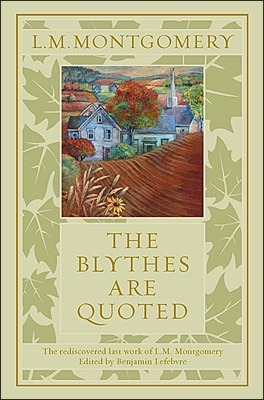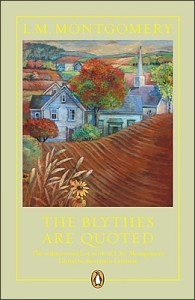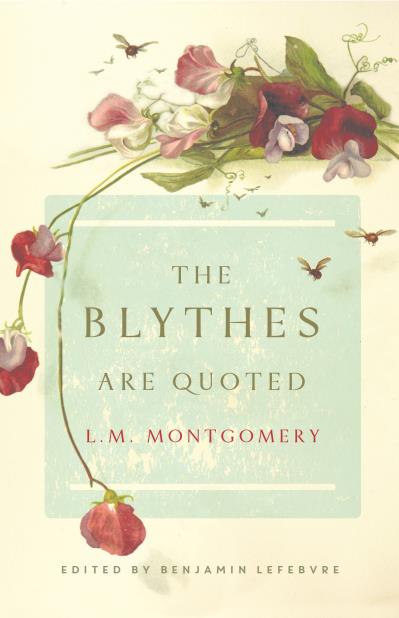
The Blythes Are Quoted is L.M. Montgomery’s final book, completed near the end of her life in April 1942. It is the last of eleven books to feature Montgomery’s protagonist Anne Shirley Blythe, preceded by Anne of Green Gables (1908), Anne of Avonlea (1909), Chronicles of Avonlea (1912), Anne of the Island (1915), Anne’s House of Dreams (1917), Rainbow Valley (1919), Further Chronicles of Avonlea (1920), Rilla of Ingleside (1921), Anne of Windy Poplars (1936), and Anne of Ingleside (1939). Divided into two parts, one set before and one set after the Great War of 1914–1918, the book consists of fifteen short stories about unrelated characters alongside vignettes featuring the Blythe family members discussing forty-one of Montgomery’s own poems, which are now attributed to Anne Blythe and to her son Walter Blythe.

A truncated version of the book—minus the vignettes and all but one of the poems, and with the short stories also abridged—was published in 1974 as The Road to Yesterday. The book was published in its entirety, edited and with an afterword by Benjamin Lefebvre, as a jacketed hardcover by Viking Canada in October 2009. This edition also included a foreword by Elizabeth Rollins Epperly. A paperback edition by Penguin Canada appeared in October 2010 to coincide with the restored and annotated edition of Rilla of Ingleside edited by Lefebvre and Andrea McKenzie. It has also been published in Polish, Finnish, Japanese, Brazilian Portuguese, and Italian, with a Turkish translation forthcoming in 2023.
This edition consists of the full text of what is believed to be the last of three surviving typescripts of The Blythes Are Quoted found among L.M. Montgomery’s papers after her death; the top copy and one carbon copy are now housed at McMaster University archives in Hamilton, Ontario, as part of its McClelland and Stewart fonds; a second carbon copy as well as single copies of two earlier typescripts are housed at the University of Guelph archives, as part of its L.M. Montgomery Collection.

A Penguin Modern Classics Edition of The Blythes Are Quoted, with a revised introduction by Benjamin Lefebvre and a revised afterword by Elizabeth Rollins Epperly, was published by Penguin Canada in July 2018.
- The Blythes Are Quoted at Penguin Random House Canada
- The Blythes Are Quoted at Benjamin Lefebvre’s website
- The Blythes Are Quoted at Wikipedia
- The Blythes Are Quoted at Goodreads
- The Blythes Are Quoted on Facebook
- The Blythes Are Quoted at WorldCat
- Q&A with Benjamin Lefebvre (October 2010)
From the Back Cover (2018 edition)
L.M. Montgomery won the world over with the young, tenacious Anne and her adventures. Now, in the last book she completed before her death in 1942, we remember the beloved author and her enduring literary legacy.
Edited and introduced by Benjamin Lefebvre, this final book consists of Montgomery’s final sequel to her internationally bestselling Anne of Green Gables. In an unusual twist to her writing style, Montgomery employs a mix of stories, poems, and vignettes, not telling one particular narrative but instead presenting snapshots of new and familiar residents of Glen St. Mary, of Anne and her family, and of their discussions around the poems composed by Anne and later by her son Walter.
In these final glimpses of characters known the world over, Montgomery offers readers a parting gift, a final farewell from herself, and from Anne.
From the Back Cover (2009 edition)
The Blythes Are Quoted is the last work of fiction by the internationally celebrated author of Anne of Green Gables. Intended by L.M. Montgomery to be the ninth volume in her bestselling series featuring her beloved heroine Anne—and delivered to her publisher on the very day she died—it has never before been published in its entirety.
This rediscovered volume marks the final word of a writer whose work continues to fascinate readers all over the world.
From the Dust Jacket (2009 edition)
Adultery, illegitimacy, revenge, murder, and death—these are not the first terms we associate with L.M. Montgomery. But in The Blythes Are Quoted, completed at the end of her life, the author brings topics such as these to the fore.
Intended by Montgomery to be the ninth volume in her bestselling series featuring Anne Shirley Blythe, The Blythes Are Quoted takes Anne and her family a full two decades beyond anything else she published about them, and some of its subject matter is darker than we might expect.
Divided into two sections, one set before and one after the Great War of 1914–1918, it contains fifteen short stories set in and around the Blythes’ Prince Edward Island community of Glen St. Mary. Binding these stories are sketches featuring Anne and Gilbert Blythe discussing poems by Anne and their middle son, Walter, who dies as a soldier in the war. By blending together poetry, prose, and dialogue in this way, Montgomery was at the end of her career experimenting with storytelling methods in an entirely new manner.
This publication of Montgomery’s rediscovered original work—previously published only in severely abridged form as The Road to Yesterday—invites readers to return to her earlier books with a renewed appreciation and perspective.
Contents
Foreword by Elizabeth Rollins Epperly (ix–xiv) [2009 edition]
Introduction by Benjamin Lefebvre (ix–xvii) [2018 edition]
Part One
The Piper (3)
Some Fools and a Saint (5–67)
Twilight at Ingleside (68–74)
I Wish You (70–71)
The Old Path Round the Shore (72–73)
Guest Room in the Country (74)
An Afternoon with Mr. Jenkins (75–87)
The Second Evening (88–95)
The New House (88–89)
Robin Vespers (90–91)
Night (92–93)
Man and Woman (94–95)
Retribution (96–113)
The Third Evening (114–17)
There Is a House I Love (114–15)
Sea Song (116–17)
The Twins Pretend (118–43)
The Fourth Evening (144–45)
To a Desired Friend (144–45)
Fancy’s Fool (146–69)
The Fifth Evening (170–75)
Midsummer Day (170–72)
Remembered (173–75)
A Dream Comes True (176–207)
The Sixth Evening (208–14)
Farewell to an Old Room (208–11)
The Haunted Room (212–13)
Song of Winter (214)
Penelope Struts Her Theories (215–52)
The Seventh Evening (253–59)
Success (253–55)
The Gate of Dream (256–57)
An Old Face (258–59)
The Reconciliation (260–66)
The Cheated Child (267–311)
Fool’s Errand (312–24)
The Pot and the Kettle (325–60)
Part Two
Another Ingleside Twilight (365–78)
Interlude (365–66)
Come, Let Us Go (367–68)
A June Day (369–70)
Wind of Autumn (371–72)
The Wild Places (373–74)
For Its Own Sake (375)
The Change (376–77)
I Know (378)
Brother Beware (379–95)
The Second Evening (396–404)
The Wind (396–98)
The Bride Dreams (399–402)
May Song (403–4)
Here Comes the Bride (405–38)
The Third Evening (439–44)
The Parting Soul (439–40)
My House (441–42)
Memories (443–44)
A Commonplace Woman (445–75)
The Fourth Evening (476–84)
Canadian Twilight (476–77)
Oh, We Will Walk with Spring Today (478–79)
Grief (480–81)
The Room (482–84)
The Road to Yesterday (485–501)
Au Revoir (502–10)
I Want (502–4)
The Pilgrim (505–6)
Spring Song (507–8)
The Aftermath (509–10)
Afterword by Benjamin Lefebvre (511–20) [2009 edition]
Afterword by Elizabeth Rollins Epperly (511–16) [2018 edition]
A Note on the Text (521–22) [2009 edition]
A Note on the Text (517–18) [2018 edition]
Suggestions for Further Reading (519–20) [2018 edition]
Acknowledgments (523) [2009 edition]
Acknowledgments (521) [2018 edition]
Books by L.M. Montgomery (525–27) [2009 edition]
Excerpt
From “The Seventh Evening”
Anne:– “Boys, I’ve written a poem today your father won’t like.” (Reads it.)
Jem:– “Mums, what made you write such a thing? I’m sure you and dad have made a success of your lives.”
Anne:– “Oh, I was just expressing a mood . . . picturing a man who had sacrificed everything for a certain kind of success and then found it wasn’t worth winning but wouldn’t admit it. There are plenty such in the world.”
Jem:– “Wasn’t it because their desire for success was selfish and their sacrifices did them no good in the end?”
Susan:– “Well, your father is a most successful doctor and has made sacrifices galore. I’m sure he doesn’t regret them or think it wasn’t worthwhile.”
Anne:– “Of course he doesn’t. He always wanted to help people.”
Walter:– “Don’t let him see that poem, mother. He might think you meant him.”
Susan:– “Your father has too much sense for that, Walter. He would understand what your mother meant. I do myself, in my humble way. Old Tom Scott over at Mowbray Narrows spent all his life squeezing and saving and denied his family everything. And on his deathbed he said, ‘I guess it wasn’t worthwhile, boys. You’ll only waste the money having a good time.’ And they did. But you and the doctor, Mrs. Dr. dear, have had your good times and yet you are successful. You haven’t missed much, as I reckon it.”
Anne, dreamily:– “If Shakespeare had only kept a diary! What did he think of success? I remember old Richard Clark of Carmody had a queer habit of saying, ‘When I meet Moses in heaven I’m going to ask him, etc.’ So when I meet Shakespeare in heaven there are a million questions I mean to ask him.”
Susan:– “From what I remember about him when I went to school I doubt very much if he did go to heaven. And whether or no, Walter, I wish you would remember that while writing poetry is a very good amusement for a woman it is no real occupation for a man.”
Praise
“This re-acquaintance with the voice of L.M. Montgomery is marvellously satisfying. . . . Lefebvre’s patient and meticulous scholarship has resulted in this fascinating volume, a gift to insatiable followers of Anne Shirley’s story.”
—Aritha van Herk, The Globe and Mail
“These are not sunshine sketches of little town life so much as darkening narratives in which humans are up against their own weaknesses and fears, anxieties and delusions. This fine and respectful collection will sustain and enhance the Montgomery legacy, deservedly so.”
—Noreen Golfman, Literary Review of Canada
“The individual stories and poems will be familiar to Montgomery fans, but when placed in the context of the frame narrative, in the sequence Montgomery intended, they take on new resonance. . . . While most accessible to serious Anne devotees, The Blythes Are Quoted provides an excellent introduction to Montgomery’s talents as an author of short fiction and poetry.”
—Catherine Tosenberger, Winnipeg Free Press
“[A] valuable addition to the Montgomery canon. . . . Anne devotees will welcome [this] glimpse into her later years, and most importantly, the rawness of the text offers insight into its author and her writing process.”
—Kerry Clare, Quill & Quire
“The Blythes Are Quoted is a wonderful discovery for fans and an important addition to L.M. Montgomery scholarship. Sixty-seven years after her death, the life and work of this beloved Canadian author continue to enchant and intrigue on many levels.”
—Laurie Glenn Norris, Telegraph-Journal
“For readers who have grown up with Montgomery’s novels, The Blythes Are Quoted is a must‒have. The last few stories, set in the years just prior to World War II, provide glimpses into the lives of the adult Blythe children. We see marriages come to fruition, and a new generation of children born. Most importantly, we get one last glimpse into the life of an iconic character—Anne.”
—Caitlin Fehir, Belletrista: Celebrating Women Writers from around the World
“The Blythes Are Quoted . . . gathers together a series of short stories, similar in style to the Chronicles [of Avonlea] though often less lush and more confident in tone, some experimental vignettes concerning the Blythe family both circa the First World War and pending the Second, and some poems attributed to Anne (who found in adolescence an outlet for her wild imagination in writing) and Walter, the poet and war casualty of the Blythe sons: evidence that Anne’s world continued to intrigue Montgomery, also evidence of her awareness of and interest in developments in Canadian literature.
—Gisèle M. Baxter, Canadian Literature
“[The Blythes Are Quoted] is a sad, powerful, fascinating and priceless restoration of the complete work that LMM originally intended. An absolute must have for any fan of Montgomery, and highly recommended to those new to her work.”
—The Indextrious Reader
Reviews
Reviews by Gisèle M. Baxter, Kerry Clare, Noreen Golfman, Laurie Glenn Norris, Catherine Tosenberger, and Aritha van Herk.
Metadata
Editor: Benjamin Lefebvre
Paratexts (2018 edition): Introduction, “A Note on the Text,” “Suggestions for Further Reading” by Benjamin Lefebvre; Afterword by Elizabeth Rollins Epperly
Paratexts (2009 edition): Foreword by Elizabeth Rollins Epperly; Afterword, “A Note on the Text” by Benjamin Lefebvre
Publisher: Viking Canada (Toronto)
Date: 2009/2018
Format: Jacketed hardcover
Trim: 8” x 5.5”
Pagination: xiv + 527 pp. (2009), xx + 521 pp. (2018)
ISBN: 978-0-670-06391-8 (2009), 978-0-735-23468-0 (2010), 978-0-7352-3468-0 (2018)
Published on 20 December 2010; last updated on 24 March 2024. Please contact the site owner with additions, corrections, questions, and suggestions.
